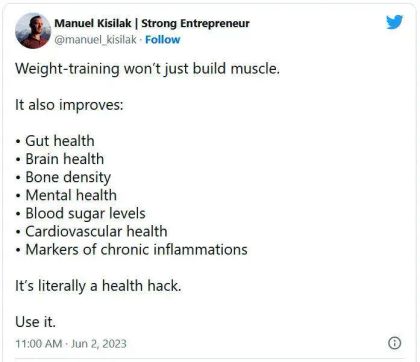1) You’re wasting time in the gym (by neglecting Progressive Overload)
The most frustrating period within my journey started after 4 months of training and lasted for two years. I barely made any progress (despite working hard) and struggled with injuries a lot. This happened because I failed to nail the most important training principle: Progressive Overload. And if you struggle to get results in the gym, I guarantee you’re making the same mistake.
Let’s dive deeper:
Have you ever wondered why it’s hard to build muscle, but easy to gain fat? It’s a survival mechanism. Back in the hunter and gatherer days, food was rare and humans were consistently on their feet. The body had to conserve energy – through fat. Muscle mass however costs lots of energy to maintain (and the body doesn’t want to keep more than necessary). This worked well 20000 years ago but is problematic in 2023. Now, humans live sedentary and in overabundance of food. It’s the opposite of what the body adapted to, but evolution hasn’t kept up with society.
Here’s the catch:
Your body won’t adapt unless you give it a reason to. That “reason” is consistently increasing stimulus, over an extended period. You trick your body into thinking that more muscle mass is needed to survive.
Here’s how you do it:
- Train with a structured program
- Have a time horizon of 6 + months
- Push your boundaries in every workout
- Aim to increase the weight or number of reps every workout
- Adhere to your program as long as you're making progress (if not, adapt)
Unfortunately, most gym-goers don’t do that. They make this mistake:
2) Sweating won’t get you in shape
Exhausting yourself is NOT enough to get lean or strong. Millions of people sweat their ass off in the gym, without ever seeing real change in the mirror. You can work hard all you want – without progressive overload, it will be wasted.
Avoid 90% of what the fitness industry is trying to sell you:
- "Muscle confusion"
- Fat-burning workouts
- Trampoline and dance workouts
- Pretty much all popular group classes
- Most of what’s marketed as “functional training”
They might be strenuous workouts, but lack load increase over extended periods. And you need that to reach your goals. Do them if they bring you fun, but don't expect results in regards to strength or building muscle. And you should care about that for the sake of your health (even if you don’t want to look huge).
3) You'll never build too much muscle by accident (in fact, you should aim to get more)
The fear of “getting too big” keeps many people, especially women out of the gym, which is unfortunate. Building strength and muscle has many benefits, far beyond looks:

Strength training has also been proven to be the best way to prevent osteoporosis (which affects mostly women). So if you’re afraid of the weights, it’s a sign you need them.
And here’s the thing:
Building too much muscle “by accident” is as likely as building a multi-billion $ company by accident. It won’t happen. Every muscular person worked their ass off, over years or even decades. Ditch this limiting belief – your health will thank you.
4) There's no "perfect" exercise and no “perfect” workout
If I wrote this article 7 years ago, I’d have told you that you MUST do Barbell Squats and do the 5x5 program. Why? Squats were my favorite exercise and 5x5 was the first program that brought me consistent results. Today, I don't share this perspective anymore.
Don’t get me wrong: Squats are great, and the 5x5 system works well to build strength. But they might not be the best choice for you and your goals. Maybe a variation, such as Split Squats, might be the better choice for you. Or maybe you don’t care that much about strength and just want to look good. In that case, 5x5 isn’t the best fit.
Be careful when fitness influencers try to sell you that one “best” workout – it doesn’t exist. The perfect workout (and exercise) is the one…
- That brings you to your goal the fastest
- You can do consistently
- You don’t hate doing
Good trainers and coaches know how to create individualized systems. Avoid trainers who only have one approach, be it diet, workout, or exercise – they are heavily biased and miss the big picture.
5) Learn proper form before you go heavy
Overloading before I knew proper technique was the main reason why the early years of my lifting journey sucked: I was caught up in a cycle of training hard, going heavier, injuring myself, having to take time to recover, starting over again, going hard, repeating.
Don't make the same mistake. Be patient and take the time necessary to learn the proper technique for your chosen lifts. This will not only prevent injury but also make sure you're building strength and muscle most effectively. Going heavy won't develop your muscle if you can’t even target it.
Before we go into how to do it, let's briefly cover what "good form" really is: It's not about having your lift look pretty - it's about using your body in the way it's designed to.
Let’s take the deadlift as an example – the principles of a proper deadlift are:
- Lifting with a neutral spine
- Keeping the weight over your midfoot
- Keeping the weight close to your body
Why these principles?
- Your lower back can handle forces best when in a neutral position (excessive rounding of your back while doing heavy deadlifts is not a good idea)
- To stay balanced, you need to keep the weight over midfoot
- Allowing the weight to drift away from your body increases the load on your spine
Still, your ideal deadlift will look different than mine.
Image Source: https://www.strongerbyscience.com/how-to-deadlift/
To sum it up: Overloading a low-quality movement is a BAD idea.
The fastest way to learn exercises properly is by hiring a good personal trainer or online coach who gives you regular video feedback. Filming your lifts regularly is necessary to see significant improvements. When I started, I tried to learn everything from Youtube videos – which didn’t work, because those videos give you information, but no feedback. And without feedback, you won’t improve.
6) You won’t get strong, fit, or lean without proper sleep, recovery, and stress management
You might not want to hear this as an ambitious person, but you won’t make it without these.
Short-term sleep deprivation leads to:
- Higher risk of injury
- Higher risks of accidents
- Higher food consumption
- Reduced insulin sensitivity
- Higher stress responsiveness
- Impaired exercise performance
- Increased inflammation markers
As a result, you have more cravings for foods (which you’re likely to act on), and less desire to move – let alone exercise.
If you want to lose weight, build muscle, or get stronger, lack of sleep turns into an uphill battle.
Long-term sleep deprivation increases the risk for severe conditions such as:
- Cancer
- Obesity
- Dementia
- Depression
- Heart disease
- Kidney disease
- Type-2 Diabetes
Sleep is the most underutilized way to improve your health and performance. And while many try, you cannot avoid it – the world record for staying awake is 11 days. Your body will force you to sleep at some point.
Learn how to optimize your sleep, even if you don’t get 8 hours consistently.
7) Fitness is more of a mental than a physical game
“You’re a fitness guy – why do you talk about this mindset stuff?” This is a question I’m asked a lot. Most trainers only focus on giving you new exercises, diet plans, or workout routines. But here’s the reality:
I could give you the perfect information to reach your goals – it wouldn’t matter if you can’t use it. Over 70% of US Americans are overweight, despite having access to great information online – for free. If more information was all it took, this statistic wouldn’t exist.
You already know something you could do to improve your fitness:
- Walk more
- Sleep more
- Drink more water
- Cut processed foods
- Eat more whole foods
- Do two workouts per week
But unless you implement it, it’ll be worthless. Your mental game decides if you’ll actually do it, and you have to work on it. Put more effort into your mental strength, and your physical strength will improve as well. Read THIS article to learn the six layers of success, which is 95% of what the “mindset” work comes down to.
8) Others will see results faster
Here’s some hard pill to swallow: Someone with "better" genetics will make more progress in 6 months than you will in 2 years, which matters especially for building muscle and strength. While you’re being sold the idea that it’s “only a matter of hard work”, you can’t outwork genetics. Don’t attach any meaning if you’re working just as hard (and smart) as someone else, but progress slower. Otherwise, your self-esteem will suffer.
This is a massive problem throughout social media because it might seem that it’s normal to be big, shredded, and able to lift triple body weight. But those are just the extremes (which get all the attention through the nature of these platforms).
I used to beat myself up when I wasn't getting as much muscle growth as other men early in my lifting journey. And by doing so, I got resentful, which was only slowing down my progress.
But – just as important – don’t take it as an excuse to put in the work. You might not have the preposition to be a top-level athlete, but committing to your fitness will greatly improve your life. I promise you that.
9) Six-pack abs are a terrible standard to assess fitness & health
Instagram makes it seem like health and fitness come down to being shredded all year round. Truth is, you can have a six-pack and still feel terrible - and many of those influencers do (even though they’d never show it). I experienced this throughout the early days of my journey:
Getting a six-pack was my priority goal, and I only cared about my looks. As a result, I ended up struggling with chronic back pain, and tight neck, and shoulder injuries – which made my life miserable, despite having ripped abs. On top of that, I got attached to that look, trying to force a flex all the time (which made me even more tense).
So how did I resolve it? Through strength training and applying the principles covered above. There’s nothing wrong with training to look good, but keep in mind that health, strength, and performance should always come first. You will look good, feel good and perform well – and that’s the ultimate goal.
10) It will take longer than you think
Building your dream physique will take years, especially if you want to build a significant amount of muscle. And while dropping bodyfat is a much faster process - you can drop 20lbs of fat in 90 days – there’s a different challenge: 95% of those who do standard diets end up regaining all the weight they’ve lost! You have to prioritize longevity over everything. Don’t get caught up in fat-loss challenges or fad diets – you’ll end up taking much longer than playing for the long game.
Remember that your body isn’t a challenge - you’re in it for the rest of your life. Use the principles in this article to make fitness an integral part of your life and it stops being a chore. And that’s the ultimate goal.
Did you enjoy this article and want to go deeper? Hop on a free breakthrough call where you will learn how to get in shape, without depriving yourself.
